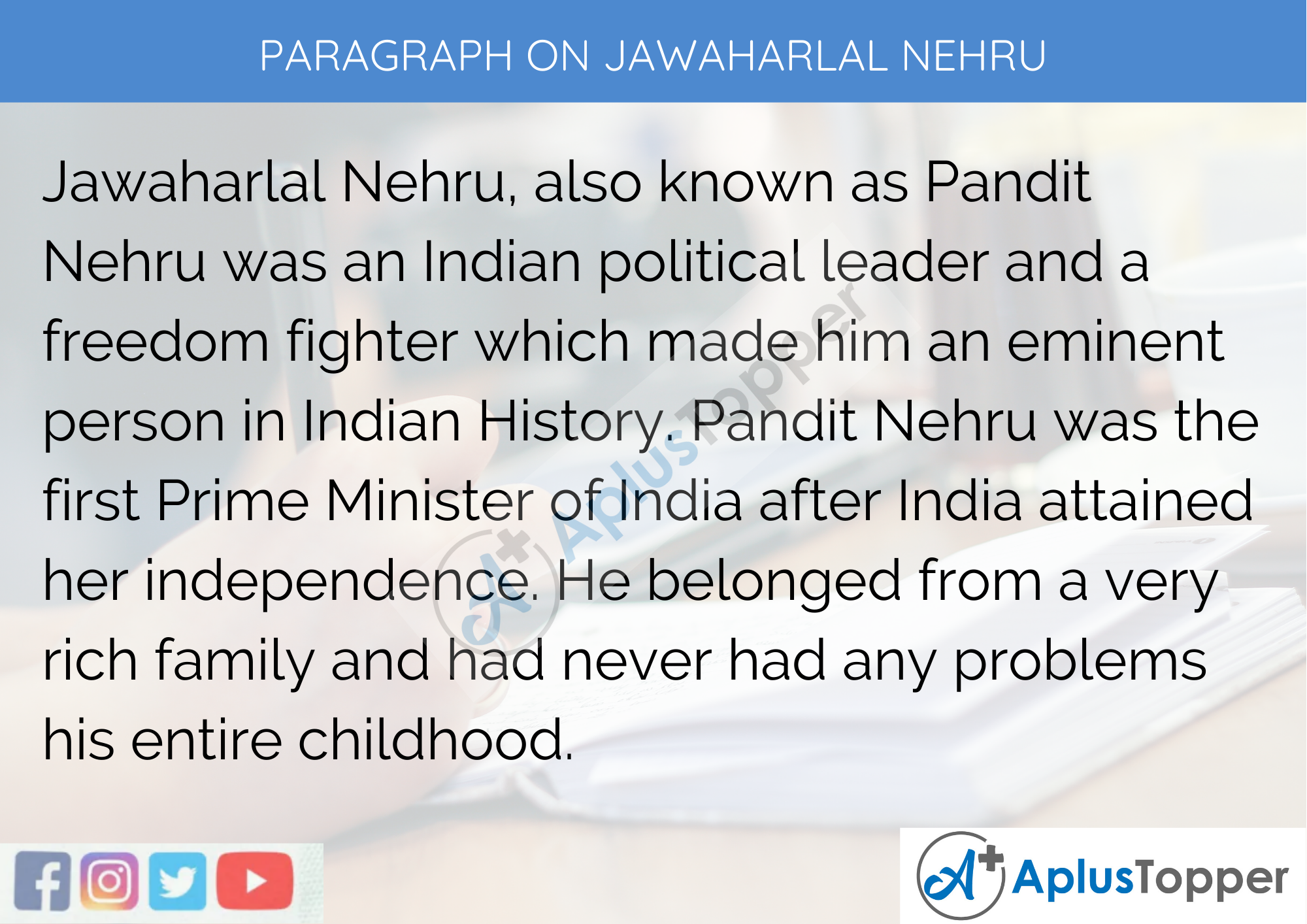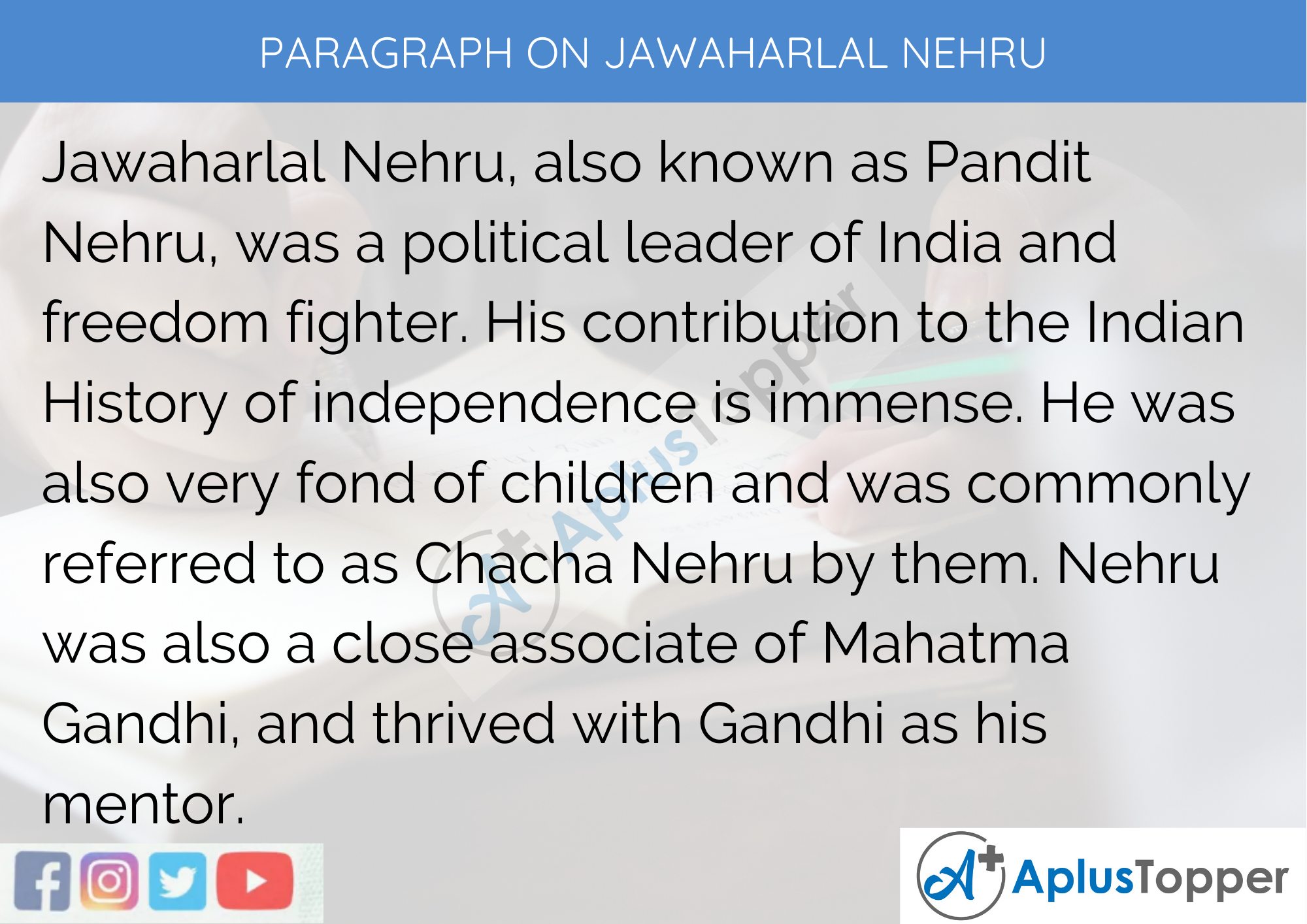Paragraph on Jawaharlal Nehru: Jawaharlal Nehru was the first Prime Minister of India, and he emerged as an eminent political leader who played a vital role in India’s independence. He was a central figure are=in India politics before and after independence.
He was such an important personality that even today, we observe his birthday as Children’s Day and given below are some paragraphs that will help kids and students belonging to different age groups know this amazing personality.
You can read more Paragraph Writing about articles, events, people, sports, technology many more.
Paragraph On Jawaharlal Nehru – 100 Words for Classes 1, 2, And 3 Kids
Jawaharlal Nehru, also known as Pandit Nehru was an Indian political leader and a freedom fighter which made him an eminent person in Indian History. Pandit Nehru was the first Prime Minister of India after India attained her independence.
He belonged from a very rich family and had never had any problems his entire childhood.
He was very close to Mahatma Gandhi, the Father of the Nation, and they both worked together to help India attain her freedom.
The children liked Pandit Nehru, and he loved and adored them. The children used to call him Chacha Nehru, and on his birthday, we celebrate Children’s Day.

Paragraph On Jawaharlal Nehru – 150 Words for Classes 4 And 5 Children
Jawaharlal Nehru was born in an elite family, his father, Motilal Nehru was a lawyer in the Allahabad High Court and also was elected the President of the Congress Party twice.
Pandit Nehru graduated from Britain but had no interest in becoming a lawyer like his father. He instead joined the Indian National Congress and became very close to Mahatma Gandhi.
In 1921, Nehru was even arrested for his role in the non-cooperation movement. Gradually with time, he became the President of CongressParty in 1929, with the unanimous support of Gandhiji.
During his years in the party, he also worked with Subhash Chandra Bose, but later they both separated when Netaji decided to fight militarily against the British.
Mahatma Gandhi, when requested by Nehru, pressed the demand that the British had to grant the status of dominions to India within the upcoming two years, which later became one year. This demand was rejected by the British. Later, Nehru demanded Total Independence from the British which had to be granted by the British in the year 1947.
Paragraph On Jawaharlal Nehru – 200 Words for Classes 6, 7, And 8 Students
Jawaharlal Nehru, most popularly known as Chacha Nehru or Pandit Nehru was a Kashmiri Brahmin who was born in a rich family and was amongst the most popular freedom fighters of India. Pandit Nehru was the first Prime Minister of independent India.
Jawaharlal Nehru’s father, Motilal Nehru was an Allahabad High Court advocate and was also the President of Indian National Congress or INC.
Nehru, unlike his father, had no intention of pursuing the same career and when he returned from England in 1912, he went to attend the Patna Session of the Indian National Congress, and that was the time when he made up his mind to join the INC.
After joining the INC, Jawaharlal Nehru became very fond of Mahatma Gandhi, and they worked together for the independence of India.
Nehru also worked with eminent personalities and freedom fighters like Subhash Chandra Bose, popularly known as Netaji.
Nehru was arrested during the non-cooperation movement as he played an active part in this movement against the British. Later, in 1929 – 1930, Nehru was chosen as the President of Indian National Congress.
From then onwards, Jawaharlal Nehru with Mahatma Gandhi as his mentor, helped India to break the shackles of the British Raj, Nehru has a huge contribution towards making India free and independent and is till date respected for his incredible contribution.
Paragraph On Jawaharlal Nehru – 250 To 300 Words for Classes 9, 10, 11, 12, And Competitive Exams students
Jawaharlal Nehru, also known as Pandit Nehru, was a political leader of India and freedom fighter. His contribution to the Indian History of independence is immense. He was also very fond of children and was commonly referred to as Chacha Nehru by them.
Nehru was also a close associate of Mahatma Gandhi, and thrived with Gandhi as his mentor. Nehru had also planned many movements demanding dominion status and total independence for India from the British.
Jawaharlal Nehru organized the first Kisan March (the march organized for the Farmers) in Pratapgarh, then in Uttar Pradesh, then known as the United Provinces.
He was imprisoned twice from 1920 to 1922 for his active role in the Non-cooperation Movement. He was the baton-charged at Lucknow and also played an essential role in opposing the Simon commission. In the year, 1928, Jawaharlal Nehru formed the “Independence of India League” and was appointed as its General Secretary.
Nehru became the President of the Lahore session of the Indian National Congress in 1929 and passed the resolution of Purna Swaraj. Again from the period of 1930 to 1935, Jawaharlal was imprisoned numerous times for his role in Salt Satyagraha, or the Dandi March, and other similar movements.
With the untiring efforts into the Indian freedom struggle, India finally attained independence on 15th August 1947, and he became the first Prime Minister of independent and free India.

FAQ’s on Paragraph on Jawaharlal Nehru
Question 1.
When and how did Jawaharlal Nehru Die?
Answer:
Jawaharlal Nehru died of a heart attack in the year 1964.
Question 2.
When did Pandit Nehru become the President of the INC?
Answer:
Pandit Jawaharlal Nehru became the President of the Indian National Congress or INC, in the year 1929 – 1930 and presided over the Lahore Sessions.
Question 3.
Who was the mentor of Jawaharlal Nehru in the INC?
Answer:
When Pandit Nehru joined the Indian National Congress, he admired Mahatma Gandhi, the Father of the Nation, who later became his mentor.
Question 4.
What are the popular titles that were given to Jawaharlal Nehru?
Answer:
Other than the titles like Pandit and Chacha Nehru, Jawaharlal Nehru was also known as the Architect of India as he played a major role in the construction of the secular, democratic, sovereign, and socialist India.
